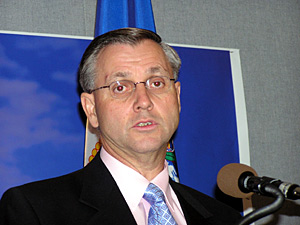July 7, 2005
 |
| Senate Majority Leader Dean Johnson outlines details of a proposal DFLers submitted to try to break the logjam at the Capitol. (MPR Photo/Laura McCallum) |
St. Paul, Minn. — Six days into the state's first partial government shutdown, the governor and legislative leaders were eager to jump-start the budget talks that broke down last Thursday night. Nearly 9,000 state employees are out of work until the matter is resolved.
Hours into last night's negotiations, Gov. Pawlenty called on lawmakers to end the gridlock.
"We need to bring this to conclusion," he said. "I wished it would have concluded long ago, but for reasons that we won't rehash right now, it did not. So, we are trying to redouble our efforts to get the negotiations moving forward and to bring the partial government shutdown to an end."
Pawlenty invited both sides to his office shortly after Senate DFLers unveiled their latest budget proposal. The offer includes an expansion the card tables at Canterbury Park. It also embraces one of the governor's education reform initiatives: performance-based pay for teachers.
Senate Majority Leader Dean Johnson described the offer as a substantial compromise.
"Governor, governor, we need to get Minnesota off the front pages, off the national news as a state that doesn't work. Governor, we need to compromise," Johnson said.
The Senate offer also revived Gov. Pawlenty's earlier proposal to add a 75-cent tax on a pack of cigarettes. Pawlenty included the same revenue source, which he calls a "health impact fee," in the counter offer he outlined Wednesday night. He also stuck with the so-called "racino," a proposal to raise money from slot machines at Canterbury Park.
That's still a deal breaker for some Democrats. House DFL Minority Leader Matt Entenza says the potential revenue from a racino would be held up by legal challenges.
"The attorney general has said that it violates the constitution. It will be tied up in courts and there's no way to get the revenue. So, we're engaging in a theoretical debate," according to Entenza.
Entenza's argument hasn't deterred Gov. Pawlenty. He views racino revenue as a sure bet, and he wants legislators to vote on the issue.
"There are competing legal opinions about the issue involved. It's been litigated in a bunch of other states and the states have won in every case, or similar issues have been litigated in other states. So we just disagree. We think it can move forward both financially and legally," he said.
The budget talks recessed at about 1 a.m. to allow negotiators more time to crunch the numbers from the new proposals. Details of health and human services spending remained up in the air.
House Speaker Steve Sviggum said the governor's latest proposal won't make everybody happy, but he called it a good compromise. Sviggum was also ready to take action on the plan.
"We're elected to vote. We're not elected to do gridlock. We're not elected to not bring a package forward We're not elected to end up at the end of the day in a special session or shutdown. We're elected to vote. I think that's a basic requirement and a request from Gov. Pawlenty that should be heeded by the House and the Senate," he said.
Once an outline of an agreement is reached, House and Senate leaders said they would call for a vote on a continuing budget resolution. If approved, the so-called "lights on" bill would allow state employees to return to work while details of the budget deal are hashed out.




